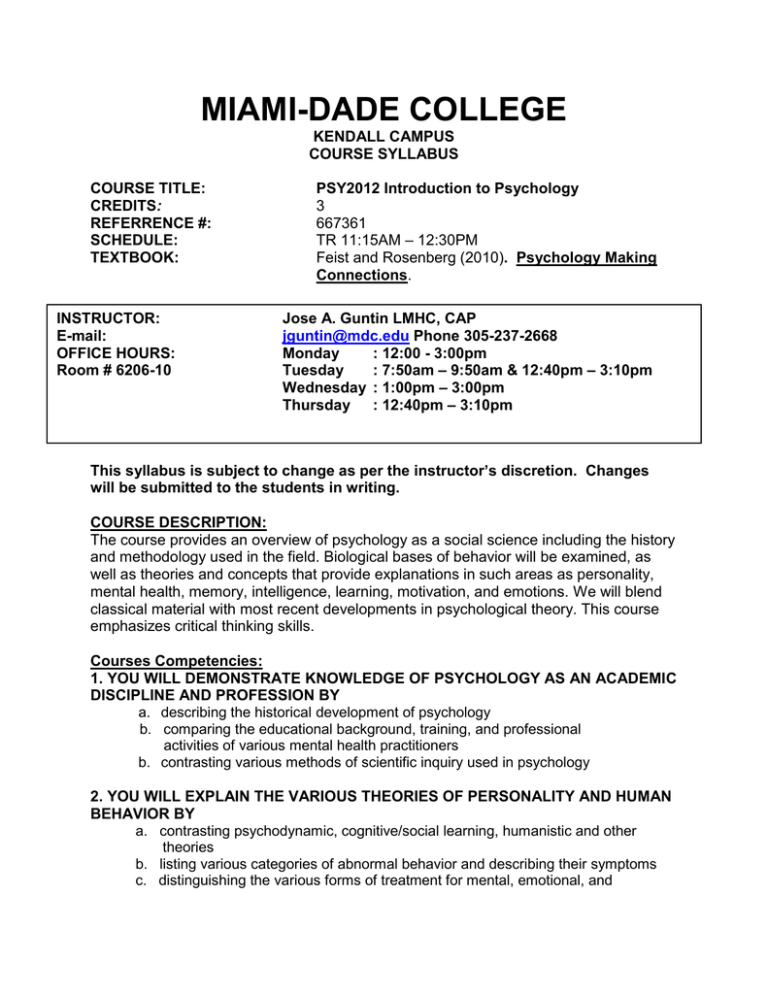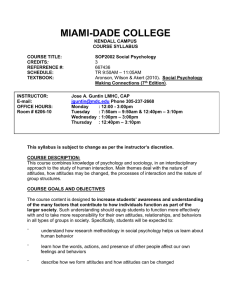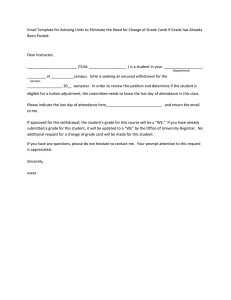MIAMI-DADE COLLEGE
advertisement

MIAMI-DADE COLLEGE KENDALL CAMPUS COURSE SYLLABUS COURSE TITLE: CREDITS: REFERRENCE #: SCHEDULE: TEXTBOOK: INSTRUCTOR: E-mail: OFFICE HOURS: Room # 6206-10 PSY2012 Introduction to Psychology 3 667361 TR 11:15AM – 12:30PM Feist and Rosenberg (2010). Psychology Making Connections. Jose A. Guntin LMHC, CAP jguntin@mdc.edu Phone 305-237-2668 Monday : 12:00 - 3:00pm Tuesday : 7:50am – 9:50am & 12:40pm – 3:10pm Wednesday : 1:00pm – 3:00pm Thursday : 12:40pm – 3:10pm This syllabus is subject to change as per the instructor’s discretion. Changes will be submitted to the students in writing. COURSE DESCRIPTION: The course provides an overview of psychology as a social science including the history and methodology used in the field. Biological bases of behavior will be examined, as well as theories and concepts that provide explanations in such areas as personality, mental health, memory, intelligence, learning, motivation, and emotions. We will blend classical material with most recent developments in psychological theory. This course emphasizes critical thinking skills. Courses Competencies: 1. YOU WILL DEMONSTRATE KNOWLEDGE OF PSYCHOLOGY AS AN ACADEMIC DISCIPLINE AND PROFESSION BY a. describing the historical development of psychology b. comparing the educational background, training, and professional activities of various mental health practitioners b. contrasting various methods of scientific inquiry used in psychology 2. YOU WILL EXPLAIN THE VARIOUS THEORIES OF PERSONALITY AND HUMAN BEHAVIOR BY a. contrasting psychodynamic, cognitive/social learning, humanistic and other theories b. listing various categories of abnormal behavior and describing their symptoms c. distinguishing the various forms of treatment for mental, emotional, and psychological disorders c. discovering the influence of culture on personality 3. YOU REVIEW BIOLOGICAL BASES OF HUMAN BEHAVIOR BY a. identifying the structures and processes of the brain and the nervous system b. explaining the senses and how they function c. discussing the nature/nurture controversy and its effects on human behavior d. identifying connections between health and stress 4. YOU WILL INVESTIGATE THE COGNITIVE ASPECTS OF HUMAN BEHAVIIOR BY a. discussing the concept of consciousness and altered states of consciousness b. describing the various theories of learning, memory, and intelligence and their influence on behavior c. relating how language and thinking affect human behavior 5. YOU WILL EXPLORE OTHER INFLUENCES ON HUMAN BEHAVIOR SUCH AS MOTIVATION, EMOTION, SEXUALITY AND GROUP MEMBERSHIP BY a. acquiring concepts regarding such influences b. identifying physical determinants of such behavior c. examining psychological determinants of such behaviors MDC Learning Outcomes 1. Communicate effectively using listening, speaking, reading, and writing skills. 2. Use quantitative analytical skills to evaluate and process numerical data. 3. Solve problems using critical and creative thinking and scientific reasoning. 4. Formulate strategies to locate, evaluate, and apply information. 5. Demonstrate knowledge of diverse cultures, including global and historical perspectives. 6. Create strategies that can be used to fulfill personal, civic, and social responsibilities. 7. Demonstrate knowledge of ethical thinking and its application to issues in society. 8. Use computer and emerging technologies effectively. 9. Demonstrate an appreciation for aesthetics and creative activities. 10. Describe how natural systems function and recognize the impact of humans on the environment. * See the College’s Learning Outcomes Web Site: http://www.mdc.edu/main/academics/learning outcomes.asp Course Requirements: You must meet all course requirements in order to pass this course. Course requirements include (1) attendance to all scheduled classes (2) completion of two reflection papers (3) one group presentation (4) four tests (5) service learning Make-up and Attendance Policy: Attendance is MANDATORY. You are expected to arrive punctually at the designated time of class. Two consecutive unexcused absences may result in a whole letter grade deduction from your final grade. Three consecutive absences will result in withdrawal from the course. Having a history of being late shall result in loss of points, up to a whole letter grade will be deducted for recurrent tardiness or having three consecutive absences. No attendance points will be awarded the day you are late. Assignments must be handed in on the day and time they are due. NO MAKEUPS unless previously arranged. A deduction of up to 75% of the points will be made for late work, even when approved due to extenuating circumstances. For instance, if the original assignment was worth 100 points, you may get up to 25 points if you submit your work late. Reflection Papers: The course requires you to write three reaction papers. In a reflection paper, you are to share your own analysis, evaluation, and interpretation about issues, problems, and questions related to the course. Although you may draw from personal experience, your ideas must be founded on sound research. Please refer to rubric included below. Presentation: Students will be responsible for a group presentation. This group will be provided with a topical issue regarding any phase of life. This presentation should be between 20 to 30 minutes per group. The instructor will grade the students on the overall presentation, information gathering and team effort following rubric included in this syllabus. Evaluation: Students are expected to become proactive in their grade. This means that you are responsible and accountable for your grade. Your final grade will depend upon: written assignments, class participation, attendance, test/quizzes, the presentation, and overall attitude toward the class and your peers. Tests may only be taken on the designated date. Do not assume that I will approve any deviations from this syllabus in relation to paper deadlines, presentation dates, or exam dates. Attendance/Participation/Quizzes (3 pts. daily)* Reflection Papers (50 pts. each) Group Presentation Tests (100 pts. each) Service-Learning 100 points 100 points 100 points 400 points 100 points ---------------800 points *Perfect attendance gives you additional points Grading System: A B ‘ C ‘ D ‘ F ‘ 720-800 640-719 560-639 480-559 < 479 Extra Credit: Several extra credit opportunities will be available during the semester for up to 20 extra points. You may be considered for extra credit after completing all regular assignments. Rubric for Written Work and Presentations 90-100 45-50 80-89 40-44 70-79 35-39 60-69 30-34 0 Shows ability to analyze and explore points presented. Ability to incorporate own ideas and external ideas other than textbook. Ability to self-question. Recognizes other possible perspectives. Points presented come from textbook. Recognition of points for further study without exploration. If there are references to emotional reaction, they are not explored. In presentation, PowerPoint has aesthetic value. Lacks detail and depth. Key argument or information is missing. Flow of ideas is disconnected. In presentation, PowerPoint lacks aesthetic value. Demonstrates lack of effort or comprehension of assignment. Does not have minimal requirements. Minimal or no creativity. In presentation, reading slides with minimal or no explanation. Assignment is missing. Access Disability Services: Students with documented disabilities should contact ACCESS Disability Services in advance for information and for obtaining assistance. No retroactive accommodations can be provided. The ACCESS department is located in Room 2121 at the Kendall Campus. They may be reached at 305-237-2767. Policy Against Academic Dishonesty: All students are expected to meet the College’s academic conduct standards. Acts of academic misconduct, including cheating, plagiarism, misrepresentation, and facilitating academic dishonesty will be referred to the Dean of Students. Students caught plagiarizing will be charged with misconduct charges. For more information on these standards, refer to Student’s Rights and Responsibilities Handbook at: http://www.mdc.edu/policy/student rights and responsibilities.pdf Any form of academic dishonesty will result in an “F” for that test or assignment and may result in an “F” in the course. Withdrawal Policy Withdrawal from a course is not encouraged and should be considered as a last alternative. You are responsible for filling out the withdrawal card and turning it in to the Registration Office before the deadline. NOTE: Failure to attend class without an official withdrawal will result in failing the course. Failing or dropping out of PSY 2012 may jeopardize your future enrollment at the college. The last day to drop a class to receive a “W” is March 14, 2012. Policy regarding the use of electronic devices in the classroom: Electronic devices for personal use such as pagers, cellular phones and i-Pods should not be used in the classroom. Please turn off or place on vibrate all gadgets before entering the classroom. Students failing to turn off these electronic devices will be asked to leave the room. Continual failure to do this may result in the lowering of points for non-participation/attendance. Visitors in the classroom: In order to maintain an appropriate learning environment, only individuals that are registered and have paid will be allowed in the classroom. Any special arrangement must be made in advance with the instructor. Academic Calendar of Events Unit/Test Syllabus/Introduction/Group Work Introduction to Psychology Chap 1 Assignment Documentary/Discussion Conducting Research in Psychology The Biology of Behavior Sensing and Perceiving our World Test 1 Human Development Documentary/Discussion Consciousness Memory Learning Test 2 Presentations (11-12-13-14-15-16) Language and Thought Intelligence, Problem Solving Motivation and Emotion Stress and Health Test 3 Personality Social Behavior Psychological Disorders Treatment Test 4 FINAL HOLIDAYS: 2 3 4 (1-2-3-4) 5 Reaction Paper 1 6 7 8 (5-6-7-8) Reaction Paper 2 9 10 11 12 (9-10-11-12) 13 14 15 16 (13-14-15-16) Letter to the Student Dear Student, It is my intention to provide the best learning environment that I can. Although I have been teaching for more than seven years, it is difficult to predict what will happen in this course. I personally find it stimulating and fun when students get involved in class discussions. As a student, you will be provided with daily opportunities to share your thoughts on topics related to the material at hand. Through the years I have been obtaining feedback from my students about both how to get A’s and how to make the course more engaging for students. Successful students indicate that getting A’s is not a matter of intelligence or studying long hours and denying yourself. They indicate that getting A’s is a matter of studying effectively. Keeping up with the work weekly seems to be linked with success, while studying without a plan is linked to feeling lost in the course and getting low grades. With the aim of helping you succeed in the course, I will provide you with copies of PowerPoints for each of the chapters that we cover. The PowerPoints can be used as a guide when you study. I will now give you the secret to get an A in this course. This secret is the result of years of feedback collected from students who got A’s in the tests. The secret consists of four simple steps. If you follow the next four steps regularly, you will see that your grades will improve. First, survey the chapter in the textbook and the PowerPoint that will be available to you. It will take you no more than five minutes; doing this will get you ready for the lecture. Second, pay attention during the lecture, bring a copy of the PowerPoint that I sent and add information or underline key concepts right on the slides. Third, review the slides as soon as possible after each class. Make sure you pay close attention to the key concepts that are underlined or highlighted by you. This will help you keep up to date. Finally, review the information before the test. This will help you to get good grades. If you find that you have to study before a test, you are doing too much and working too hard to be able to get the A that you want. If you follow the simple four steps regularly, you will be surprised to find that getting A’s may not be that hard. Getting A’s doesn’t require extra work or studying long hours before a test. Getting A’s requires getting used to doing a little bit of work throughout the semester. I understand that we will be covering a lot of material and a lot of new terms; but, if you keep up with the work, not only you will get good grades, but you will find that this course could be fun and interesting. One final and most important word: I’m here to help you. Come to see me during office hours, talk to me before or after class, or keep in touch by sending e-mails about any concerns you may have. I will always try to help you. I wish you the best of success.


